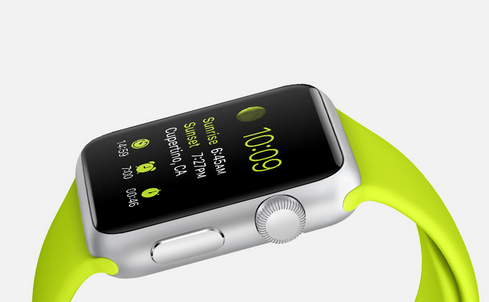Apple Watch Orders Top 5M, Healthcare Features KilledApple Watch Orders Top 5M, Healthcare Features Killed
Apple is confident its Watch will be a hit, since Cupertino has placed between 5 and 6 million orders. However, the company has killed some healthcare features, according to reports.


Apple Watch: 11 Sweet Gadgets To Buy Instead
Apple Watch: 11 Sweet Gadgets To Buy Instead (Click image for larger view and slideshow.)
Apple is prepared to make a big splash with the Apple Watch, even though the device won't live up to CEO Tim Cook's initial vision. Apple was forced to remove advanced health features that were too unreliable. Even so, the iPhone-maker has placed orders for between 5 and 6 million of the pricey wearables.
Apple executives had hoped the Apple Watch would be a futuristic health tracker, capable of checking blood pressure, stress levels, and heart activity, according to sources cited by the Wall Street Journal (full story behind pay wall). Sadly, Apple couldn't get these features to function properly. People familiar with Apple's plans said these advanced features were unreliable, too complex, and might have even heralded government regulation.
In response, Apple dropped them.
Without these state-of-the-art features on board, Apple was left scrambling to find other ways to make the wearable appealing to consumers. Comments made recently by Cook at the Goldman Sachs Technology and Internet Conference would have us believe the Watch to be a life-changing device.
"If I sit for too long, it'll tap me on the wrist and tell me to move," said Cook. "A lot of doctors believe sitting is the new cancer. If you haven't moved within the hour, it'll tap you. You'll be in a meeting, and we have a lot of employees now that are using the watch, so about 10 minutes before the end of the hour, everybody starts standing up." Cook said Apple wants to "change the way you live your life."
That's not all the Apple Watch does.
It also includes Siri, which Cook uses a lot, and Apple Pay. It displays notifications and alerts; tracks daily activity, including your heartbeat; and runs third-party apps. "One of the biggest surprises people are going to have when they start using it is the breadth of what it will do," said Cook.
Much of what the Apple Watch will be able to do at launch relies on the iPhone. It uses Bluetooth to communicate with the smartphone and sync data. Much of the wearable's power will come from Apple's popular handset. Luckily for Apple, Google's Android Wear platform faces the same limitations.
Apple has bullish hopes for the Watch. It has placed large orders ahead of the April launch from a handful of different manufacturers, says the Wall Street Journal. With about 5 or 6 million on deck for its first quarter of availability, Apple clearly thinks it has a hit on its hands. By way of comparison, Google's manufacturing partners shipped only 720,000 Android Wear devices between June and December 2014. The entire wearables market worldwide totaled just 4.6 million shipments for 2014, the bulk of which were fitness bands.
[ Read about the iPhone kill switch. ]
Most fitness bands cost between $100 and $200, while smartwatches range from $150 to $300. The Apple Watch starts at $349, but no one yet knows how pricey it will get. There are three editions planned, covering the entry-level device, a mid-range device, and gold-plated high-end versions. Demand for wearables in general is rather weak.
Whether or not Apple's wearable will change consumers' minds is anyone's guess.
Attend Interop Las Vegas, the leading independent technology conference and expo series designed to inspire, inform, and connect the world's IT community. In 2015, look for all new programs, networking opportunities, and classes that will help you set your organization’s IT action plan. It happens April 27 to May 1. Register with Discount Code MPOIWK for $200 off Total Access & Conference Passes.
About the Author
You May Also Like






